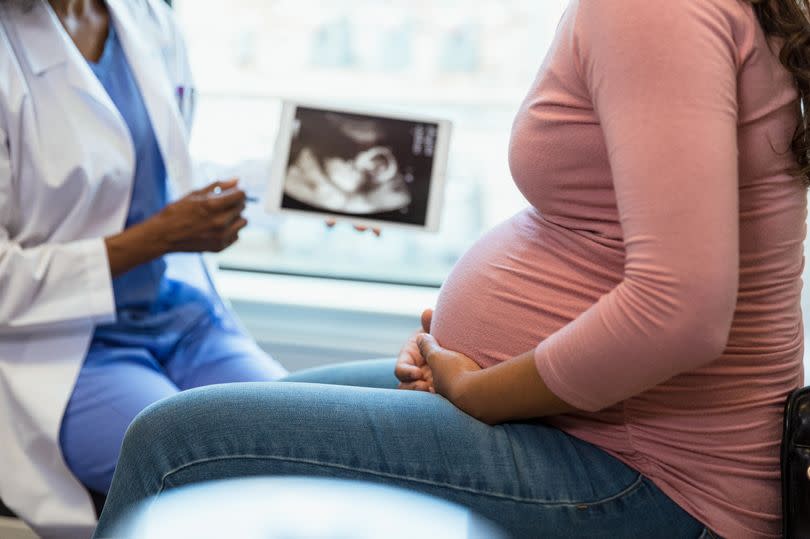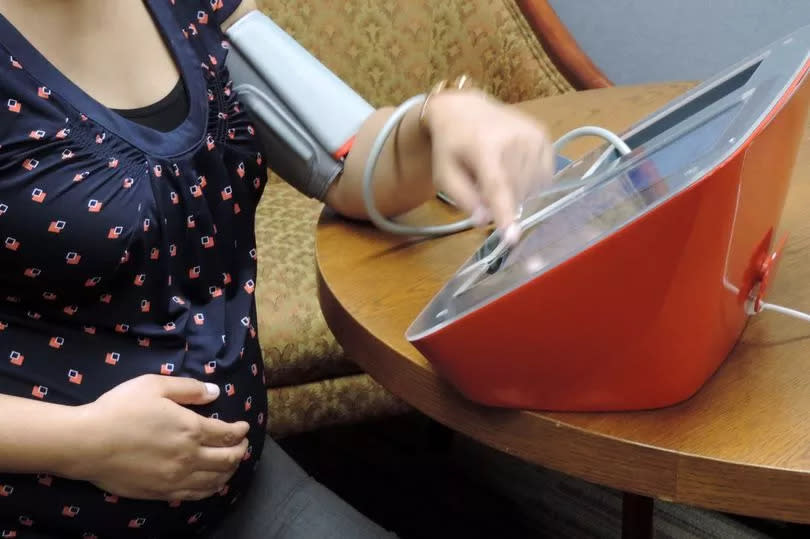'Detection of deadly pregnancy condition' may be improved with personalised screenings

A new study suggests that personalised screening early in pregnancy could enhance the detection of a potentially fatal complication.
Scientists believe that this more comprehensive screening method during the first trimester could help identify early signs of preeclampsia. This condition, characterised by severe high blood pressure and damage to the liver or kidneys, is one of the leading causes of death during pregnancy globally.
Pre-eclampsia not only poses a significant risk of complications and death for both mother and unborn child, but also doubles a woman's risk of heart diseases like high blood pressure, heart attack, stroke or heart failure later in life.
The condition affects up to one in 14 pregnant women, including celebrity mums like Kim Kardashian, Mariah Carey and Sophie Ellis Bextor.
In the UK, it is found in approximately 42,000 - or six per cent - of pregnancies each year - reducing the flow of blood through the placenta - which can lead to stillbirth or even maternal death. Children born to mothers with preeclampsia are also at an increased risk of developing high blood pressure and heart disease.

While many women experience mild symptoms, in some cases, the condition becomes so severe that the baby needs to be delivered prematurely.
In a groundbreaking study involving over 7,000 women, researchers have found that a new screening method incorporating maternal history, biomarker tests, and ultrasound scans outperforms the existing risk factor-based guidelines in predicting the likelihood of pre-eclampsia.
Professor Emmanuel Bujold, senior author from Laval University in Canada, highlighted the gravity of pre-eclampsia, stating: "Pre-eclampsia is one of the most severe illnesses of pregnancy and may lead to preterm birth and/or maternal death."
He further clarified that while the biological processes leading to preeclampsia typically begin in the first trimester, symptoms often don't manifest until after week 20.
Under current guidelines based on risk factors, aspirin is advised for pregnant women with major risk factors such as chronic high blood pressure, type 2 diabetes, chronic kidney disease, lupus, or a history of pre-eclampsia in a previous pregnancy.
Additionally, aspirin is recommended for those with at least two moderate risk factors, which include being a black woman, having a family history of pre-eclampsia, experiencing a first pregnancy, obesity, or undergoing an IVF pregnancy.

Prof Bujold pointed out the implications of these guidelines, saying: "Following those guidelines, almost all black women should take aspirin during pregnancy, as should about one-third of all women of other races and ethnicities."
Earlier research has demonstrated that preterm pre-eclampsia, which occurs before the 37-week mark, can be predicted in the first trimester through a combination of ultrasound and blood biomarker testing.
In the new study, researchers recruited Canadian women, average age 29, who were between 11 and 14 weeks pregnant. They evaluated a screening model consisting of maternal history, ultrasound data and several tests for blood markers.
The findings, published in the journal Hypertension, showed that for participants between 11 and 13 weeks of pregnancy, the pre-eclampsia detection rate was 63.1 per cent.
Prof Bujold said: "Using this new screening model, treatment decisions were based on each individual's personal risk. With their personal risk calculated, it's much easier for a woman to make the right decision, for example, if she chooses to take daily low-dose aspirin, she is much more likely to follow through because it's based on personalized screening test.
"It's reasonable to believe that the inclusion of the entire population and immediate analysis of blood samples may both have improved the screening process. If we implemented a screening programme in big cities across North America, the screening would be expected to be even better and more accurate."
He added: "The good news is that we now have a more precise screening approach using existing tests that can predict pre-eclampsia early in pregnancy. The next step is to make this screening available to all pregnant women so that more women could receive a diagnosis early in pregnancy and begin preventative aspirin treatment, potentially preventing complications of severe preeclampsia."
Professor Sadiya Khan of the American Heart Association responded positively to the study results.
She highlighted: "Since the risks for preeclampsia may be largely influenced by health before pregnancy, the ability of a screening model to be applied in early pregnancy is very helpful and can initiate conversations between the clinician and patient about strategies to optimize heart health."
"However, challenges remain with implementation of models such as this one that integrate biomarkers that are not routinely assessed and may not be widely available, especially among people in vulnerable populations who are most likely to have the highest risk for preterm pre-eclampsia."
Don't miss the latest news from around Scotland and beyond. Sign up to our daily newsletter.

 Yahoo News
Yahoo News 
